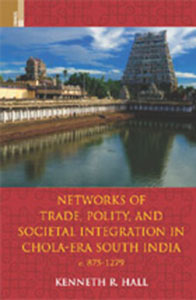
Networks of Trade, Polity, and Societal Integration in Chola-era South India, c. 875-1279
AUTHOR – Kenneth R. Hall
| HB ₹995 . $79.95 . ₤52.95 |
||
INFORMATION
- AUTHOR : Kenneth R. Hall
- ISBN : 978-93-80607-44-3
- Year : 2013
- Extent : xii + 280pp
- Discount available on checkout
- Usually dispatched within 3 to 5 working days.
Networks of Trade, Polity, and Societal Integration in Chola-era South India, c. 875-1279
| HB ₹ 1095 . $ . ₤ |
PB ₹ . $ . ₤ |
|
| POD ₹ . $ . ₤ |
e-Book ₹ . $ . ₤ |
INFORMATION
- AUTHOR – Kenneth R. Hall
- ISBN – 978-93-80607-44-1
- Year – 2013
- Extent: 400 + 40 coloured illustrations
- 10% discount + free shipping
- Usually dispatched within 3 to 5 working days.
This book studies transitional south Indian society during the critical Chola age, c.875-1279, when there was notable evolution of pre-existing as well as new societal institutions. Networks of Trade, Polity, and Societal Integration in Chola-Era South India, c.875-1279 considers issues of emic (‘local’) and etic (‘external’) agency; the origin of urban communities relative to movements of material and ideational ‘commodities’; confrontations between alien cultures, formation of plural societies, dual loyalties, and multiple affiliations. Specifically, this book highlights the south Indian epigraphic sources that document the purposeful creation of clearly defined market and temple districts adjacent to settled agricultural societies, which were to be populated by multi-ethnic merchants, artisans, warriors, rulers, agriculturalists, and priests from the various regions of the south Indian downstream river basins and their hinterlands, as well as the Indian Ocean.
Local inscriptional records are notable for their variety of detailed societal contracts, marketplace charters, and the coincidental approval of religious institution relationships that served the religious, political, cultural, and productive economic needs of the various societal communities. These civil records are consistent with contemporary charters of Hindu temples that were foundational to invasive urbanism into previously rural societies. In sum, this book incorporates new social network literature as a means to re-examining local historical records, to better understand the variety of regional primary and secondary urban networking that was basic to early south Indian societal change.
The Author
Kenneth R. Hall is Professor of History at Ball State University, Indiana. His publications include four edited volumes, The Growth of Non-Western Cities: Primary and Secondary Urban Networking, c. 900-1900 (2011); Secondary Cities and Urban Networking in the Indian Ocean Realm, c. 1400-1800 (2008); Maritime Diasporas in the Indian Ocean and East and Southeast Asia, c. 960-1775 (2006); and Structural Change and Societal Integration in Early South India (1991/1995); and two coedited volumes, New Perspectives in the History and Historiography of Southeast Asia, Continuing Explorations (with Michael Aung-Thwin, 2011) and Explorations in Early Southeast Asian History: The Origins of Southeast Asian Statecraft (with John K. Whitmore, 1976).
This book studies transitional south Indian society during the critical Chola age, c.875-1279, when there was notable evolution of pre-existing as well as new societal institutions. Networks of Trade, Polity, and Societal Integration in Chola-Era South India, c.875-1279 considers issues of emic (‘local’) and etic (‘external’) agency; the origin of urban communities relative to movements of material and ideational ‘commodities’; confrontations between alien cultures, formation of plural societies, dual loyalties, and multiple affiliations. Specifically, this book highlights the south Indian epigraphic sources that document the purposeful creation of clearly defined market and temple districts adjacent to settled agricultural societies, which were to be populated by multi-ethnic merchants, artisans, warriors, rulers, agriculturalists, and priests from the various regions of the south Indian downstream river basins and their hinterlands, as well as the Indian Ocean.
Local inscriptional records are notable for their variety of detailed societal contracts, marketplace charters, and the coincidental approval of religious institution relationships that served the religious, political, cultural, and productive economic needs of the various societal communities. These civil records are consistent with contemporary charters of Hindu temples that were foundational to invasive urbanism into previously rural societies. In sum, this book incorporates new social network literature as a means to re-examining local historical records, to better understand the variety of regional primary and secondary urban networking that was basic to early south Indian societal change.
The Author
Kenneth R. Hall is Professor of History at Ball State University, Indiana. His publications include four edited volumes, The Growth of Non-Western Cities: Primary and Secondary Urban Networking, c. 900-1900 (2011); Secondary Cities and Urban Networking in the Indian Ocean Realm, c. 1400-1800 (2008); Maritime Diasporas in the Indian Ocean and East and Southeast Asia, c. 960-1775 (2006); and Structural Change and Societal Integration in Early South India (1991/1995); and two coedited volumes, New Perspectives in the History and Historiography of Southeast Asia, Continuing Explorations (with Michael Aung-Thwin, 2011) and Explorations in Early Southeast Asian History: The Origins of Southeast Asian Statecraft (with John K. Whitmore, 1976).





